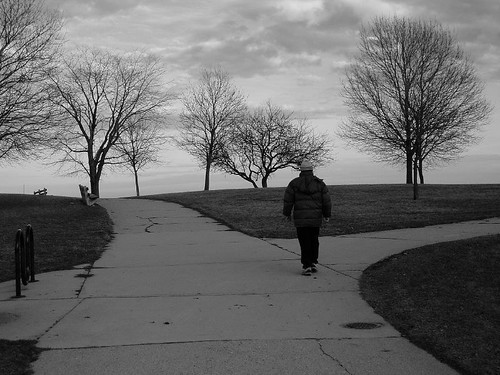Passion Sunday (C)
The Difference The Road Makes
Readings: Isaiah 50:4-7; Psalm 22:8-9, 17-18, 19-20, 23-24; Philippians 2:6-11; Luke 22:14-23:56 or 23:1-49
Picture: cc Michael Lehet
Dear sisters and brothers, what do you think? If two people want to get to the same destination, does it make a difference which road they take? Does it make a difference, for example, that one person takes a longer and another a shorter road, if both end up, or seem to end up, at the same place? Think of college diplomas, for example. Many people get one – as I did – by studying for several years in a university when they’re teenagers or young adults. But then there are also others who receive their diploma only years later, after many hours of night school perhaps. Does it make a difference either way? Does it make a difference whether you’re lucky enough – as I still am – to have someone else to pay for your studies, or if you have to work hard to pay for them yourself?
In a way, perhaps there is no difference. The diploma you get is the same. The paper on which it is printed is the same. But is the paper really all that matters? After all, I’m told that in some places it is possible, to buy a college diploma without actually having done any coursework. Does it make a difference if you do that? The paper is the same right? And yet, if we think a little more about it, there really is a difference, isn’t there? There is a difference because although the paper may be the same, the person who holds it is not. Even if, on the surface, the destination you arrive at – the piece of paper – may seem the same, the road you take makes all the difference.
It’s useful to keep this in mind as we reflect upon our readings today. For what are we trying to do in Holy Week, except to accompany our Lord Jesus on the road? Today, on Passion Sunday, we recall how, accompanied by his friends and disciples, Jesus finally arrives in Jerusalem, and is joyously welcomed by the people there. In a sense, Jesus and his traveling companions have the same purpose for coming to the Holy City. They come so that Jesus can take possession of the kingdom prepared for him since before the world began. They want to enter into glory. And we can say the same too for all the other characters in the Passion story that we heard just now – the people of Jerusalem, the chief priests and the scribes, Pilate and Herod, the soldiers and even the two thieves. In some way, everyone wants to reach the same destination as Jesus. Every one wants to enter into glory. But not everyone is willing to take the same road. Indeed, there are some very striking differences between the roads the others take and the one that Jesus chooses.
Consider, for example, the group of people closest to Jesus, his own apostles. Although, on the surface, it seems like they are walking with Jesus, in reality, they are on a very different road. On the night before their Master is to die, just after he has shown them how heartbroken he is that one of them will betray him, the Twelve start arguing about who among them is the greatest. By doing this, they show that their road is not much different from the one traveled by the chief priests and scribes, as well as by Pilate and Herod. It is the road of power and violence and lordship. In contrast, Jesus is the suffering servant that we heard about in the first reading. He walks the road of service. I am among you as one who serves. I have not rebelled. I gave my back to those who beat me, my cheeks to those who plucked my beard…
Consider also the difference between Peter and Jesus. Notice Peter’s false self-confidence. Lord, I am prepared to go to prison and to die with you, he says. Peter is unaware of his own weakness. He fails to realize that true strength comes from God alone. By his words he shows that, not unlike the unrepentant thief, his is the road of arrogance. Contrast that with the humility of Christ. Even though he himself is without sin, in the Garden of Gethsemane, Jesus openly tells his heavenly Father about his own interior struggles. Father, if you are willing, take this cup away from me… Humbly, Jesus prays for strength, even as his closest disciples remain asleep. And his prayer is heard. He receives the comfort and courage that he needs to face the terrors that are to come. We see the same humility, the same willingness to accept the truth, in the repentant thief. We have been condemned justly, he says. And he too receives what he asks for. Today you will be with me in paradise. Yes, at this point, even the great apostle Peter is walking a different road than Jesus. But Jesus tells him that he has prayed for him. So that when Peter has turned back, he can then strengthen the others.
Consider also the road chosen by Pilate and Herod. We’re told that although they were enemies at first, they became friends after meeting Jesus. Perhaps this is because they realized that they are both walking the same road, the road of self-preservation. By uttering a single word, either Pilate or Herod could have saved Jesus. But neither of them did so, because to do so would have been very dangerous for them. Freeing Jesus might cause a revolt. Which would then make Caesar very unhappy. And what would happen to them if Caesar was unhappy? Better to send an innocent man to his death. Better to walk the way of self-preservation. In contrast, Jesus walks a different road. Not self-preservation, but self-emptying. As the second reading tells us, the road chosen by Jesus involves a double self-emptying. There is first a divine self-emptying. Though he was in the form of God… he emptied himself, taking the form of a slave, coming in human likeness. Then there is a human self-emptying. He became obedient to the point of death, even death on a cross. And it is because of this double self-emptying that Jesus is then raised up to the glory of God the Father.
Sisters and brothers, even if glory is the same destination that everyone wants to reach, we take many different roads to get there. At the beginning of this most holy of weeks, as we celebrate Passion Sunday, we who claim to be followers of Christ are invited to consider carefully the road chosen by our Master, so that we can follow more closely in his footsteps. And it is important for us to do this especially today, when our Church continues to undergo the terrible Passion of sexual abuse scandals. In this difficult time, when the temptation is great to choose other roads -- roads of arrogant self-assertion, or anxious self-preservation, for example -- our Lord continues to show us the way of service and humility and self-emptying. He continues to show us how to walk the way of the Cross, the only way that leads to true Glory.
In the poem that many of us know so well, Robert Frost once wrote that taking the road less traveled had made all the difference. Sisters and brothers, as individuals and as Church what road are we traveling, what difference are we making, today?



